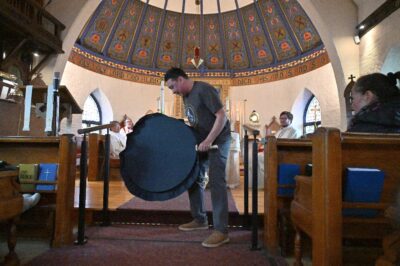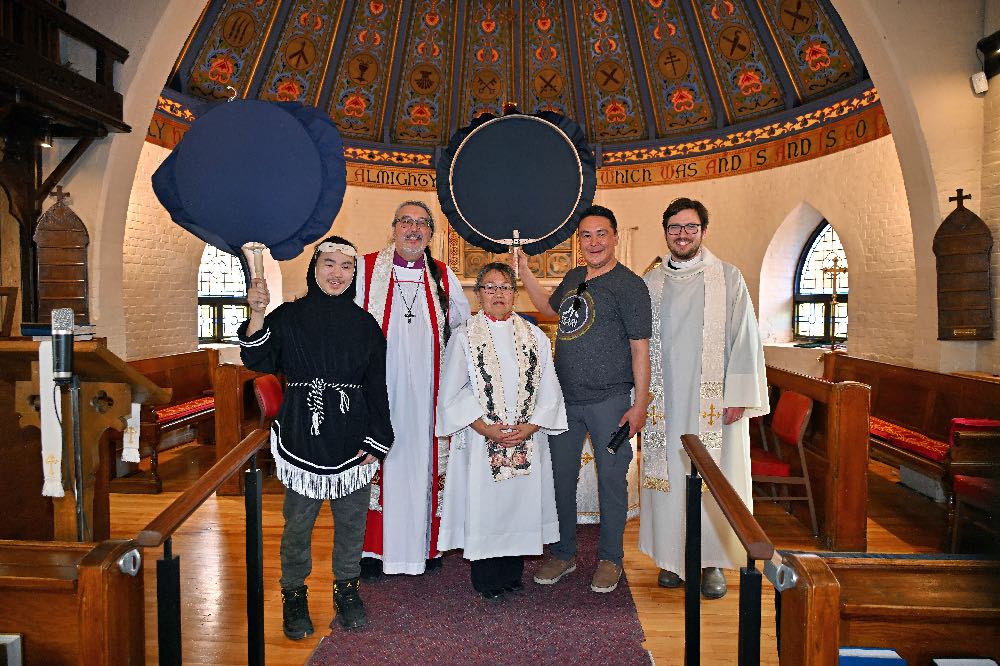Archbishop Chris Harper made his first visit to the Anglican Diocese of Ottawa since he was named National Indigenous Archbishop in 2022, and it was an action-packed few days. Invited as a guest speaker for the North American Cathedral Deans Conference, he also made time to talk with the All My Relations Circle and to visit St. Margaret’s Anglican Church, including a remarkable cultural exchange with the Inuit congregation.
The archbishop spoke to the deans about developments in the self-determining Indigenous Church. He explained that healing comes “when we start to walk together in respect, dignity, and understanding, but we need to know each other…. Listening, learning and opening of heart and mind are so important.”
When he visited the parish of St. Margaret’s, Vanier, he preached at both Sunday morning services. His homily for the English congregation was very personal and offered an opportunity for parishioners to get to know more about him.
He focused on how much God’s love and power working in frail humans in the church and individual lives can do. “It’s wide enough to reach out and embrace all of our doubts, our denials, and even our rejection,” he said.
He spoke about his own experience of trying to avoid and run away from God’s call earlier in his life. “God is patient, and … God is love because God is willing to send out even the likes of me into the God service. A man who needed to experience much, to do much wrong and to be enabled to speak and preach about it again in a true-life perspective or view. I’ve never, ever claimed to be the wisest or the best at anything and still God called and uses me to proclaim a message of love.”
Along the way, he said he has learned “to see that it’s not about me, but about what God could do through us, the broken, in the ministry of the church.”
The archbishop said parishioners have ministries and callings that are “equally and maybe even more important…You go out back into your home communities. You … are the ones who talk to others, leaning over the fence and when you say those words, ‘Hey Jim, how are you doing? Oh, really? Okay, well, we’ll think about that, we’ll pray about that. Well, hey, why don’t you come to church with me?’ You see how this works? A minister can’t do that. You can.”
The Inuit congregation of St. Margaret’s welcomed Archbishop Harper with a Inuit song and drumming. The Rev. Canon Aigah Attagusiak translated the archbishop’s words into Inuktitut.

Drummer Ruben Komangapik, translated some of the words in the song into English: “I walk through this world, on this land, I step on a piece of rock, and I turn to you. You’re stomping your feet. I walk through this land. I step on this rock. I turn to you, and you’re understanding. I walk through this land, I step on this rock, now you’re following.”
The archbishop said he was incredibly honoured by the song, and he in turn, played a recording of a song from his own Plains Cree culture.
“My people are the tall ones with long hair,” he said. “But one thing unites us as people of the land. We love to laugh. We love to smile and sing. And we understand what community is all about….We are one in the Creator’s love…We are blessed to know the land intimately, so much so we can be called people of the land.”
Then, he spoke of shared pain. “Our shared history with the church has been a complicated and broken relationship. For my people of the plains, we have been known as the people with the hair, and when they put our people into the schools, the residential schools, they cut our hair to remind us we are not connected to the land anymore. The symbols we use, whether it be a drum, or the songs we have as a people, the dances, the ceremonies, and even our own traditional food, [we] were told it was wrong.”
And the archbishop spoke of new hope: “But the church, much the same as the song, dear brother, learns that it walks on a new land in a new way, where I stepped on a rock, and I look back, and now you follow. Now they have a chance to open their hearts, their minds, and their eyes and to see the songs, the ceremonies we offer back, which builds the church as it should be, where we sing together and we celebrate together in our languages, in our way of song.”
He shared a story of how much this change in the church and the new self-determining Indigenous church means to him. “When I was in school to study to be a priest, one of my best friends was going to be ordained as a priest. I went to his service, and for the first time I smelled the prayers of the land. I saw a feather of prayer being held up, and I heard a drum song of honour being sung. I cried … because I did not think I would ever live long enough to see that in a church. I cried because I rejoiced, because the church was open enough to listen, to see, and to feel and know our people….
“All of us together. Know there are no limits now. The door has opened in the church to all of us. I see amazing preachers. I hear amazing songs in our languages. And I hear beautiful, beautiful hearts in what we offer together by lifting it up in prayer.”
— with files from Jane Waterston
Related story: Archbishop Chris Harper meets with All My Relations Circle




Saint Mary’s Church, Westmeath — Deanery of the Northwest